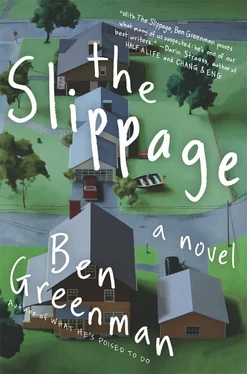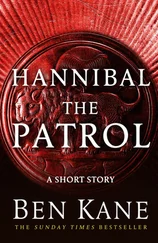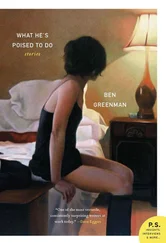“Bye, Mom,” the package said.
After a series of calls thick with implication, Karla had gotten to it. She wanted William to take Christopher out for an afternoon. “He’s been having a rough time ever since Matthew and I split up.”
“You split up?”
“About a month ago. Matthew moved on. I knew he would. It should be his slogan: ‘Matthew moves on.’ He got close to Chris, though, which means that now I have a boy on my hands who wonders why people get close to him, then run away. Will you take him to the park for me?”
“You want me to leave him there?”
A mix of laughter and sadness filled the line. “Just take him out there. Throw some bread at the ducks. I don’t care. He knows you, he feels safe with you. Be a kind of uncle.” And so William had stood looking into a cage in his garage, thinking of how little of what he owned appealed to a boy. He had a baseball glove, but it was plastic, a developer’s giveaway from a promotion a few years before. He had a Frisbee that was also a giveaway, and a kite he’d bought as a birthday present for Graham Kenner’s son but never delivered. He dumped them all into the trunk and went inside to find Louisa. She was in the junk room, on the computer, a catalog open next to her. “I’m heading out to run some errands,” William said. “I have to get some stain for the deck and a few other things. What are you up to?”
“I’m going to try my best to do nothing.”
“Okay,” he said. “See you around four.” She hadn’t mentioned the new house in days. He wondered if the idea had moved on or if it was waiting in the weeds, ready to take him when he wasn’t looking.
Small, dark, with a weight in his gestures, Christopher sat still for most of the drive, staring forward. Karla had let on that Christopher was flourishing in some regards and wilting in others. He could tie knots, more kinds than William knew existed, and he loved to read the newspaper in the old-fashioned way, and he could sketch out the history of the nation from the time of early Indians. He was a devoted if not a good athlete, especially when it came to sports where speed trumped strength. But he was lonely. “He has a hard time making friends,” Karla had said. “Sometimes he’ll be talking about something that interests him, and it’s like his entire being is lit from the inside, and then he’ll suspect that I’m not listening, or giving him my full attention, and he won’t get angry so much as empty. He’ll just vacate the spot where he was a minute before. If that happens with his mom, who’s trying her hardest, I wonder what happens with kids at school.”
William asked Christopher if he preferred music or talk radio. “Talk,” he said, but the first station they found was a pastor suggesting that modern man was in exile from himself, and Christopher grew bored and started to talk about a dead turtle he had found behind his house, its shell beginning to soften. To a series of questions about class, about sports, about girls, Christopher issued brief responses and then was rigid with them for a few seconds. “You love being interviewed, I see,” William said, and the boy surprised him with a smile.
At the park, William popped the trunk and told Christopher to pick out what he wanted. He went right for the kite, a red hexagon with a yellow tail. “This,” he said. “Definitely.”
The park brimmed with children. Teenage girls thumbed cell phones. Small boys offered up die-cast cars to older brothers. William got the kite up in the air and passed Christopher the reel; he played it out or in, trying to keep the thing aloft. Every few minutes it went into irons and came crashing back to the ground. “That’s the thing about kites,” William said.
“I don’t mind,” Christopher said. “It’s fun to get it going again.” He ran to launch it: a successful flight, then an unsuccessful one, then a brief stay in a birch tree. Another boy a few years younger than Christopher came toward them from the far end of the lawn, cradling a mangled delta kite; his father followed, explaining something about inevitability. Then, behind the man, William noticed a man biking around the edge of the park: Stevie. He was wearing the same blue biker shorts he had been in at the door and a bright yellow T-shirt with an Arrow logo. Stevie spotted William, hopped off his bike, and wheeled it over.
“Hey,” William said, trying for neighborly. “You here for the exercise course?”
“No,” Stevie said. “Tweaked a delt the other day moving some furniture. I’m just doing laps. Who’s this?”
“This is Christopher,” William said. “Friend of the family. I’ve known him since he was this high.” He kneeled down and pressed his hand down flat to the ground. The three of them smiled against the light wind. It felt almost like friendship. Then Stevie started telling Christopher how to fly the kite. “Get it up above the tree line,” he said. “That way there’s enough wind to keep it aloft.” He was right, William knew, but Christopher was having fun running back and forth.
The wind surged, then faded, and the kite drifted into a dead patch. Christopher and William followed it as it slid slowly downward. “Make sure the bridle is set correctly,” Stevie said. “I think the way you have it, the thing comes down too fast.” Christopher fiddled with the kite and relaunched it. This time it went up over the trees and shone like a deep red place in the bleached-out sky. “Will you look at that?” Stevie said. “I knew it would work.”
A kite up over the trees was good for a minute or so. “After this can we play Frisbee?” Christopher said. William nodded, but he wasn’t sure how he was going to throw the thing; his fist was clenched so tight it felt like it was cramping.
The man from San Diego was named Ruben Whitfield. He was short, with large features that gave him a friendly if slightly vacant aspect. He was careful everywhere he went, the kind of man who looked at a spot before he sat down in it. On his first day, he made a point of going from office to office, acquiring one germane fact about each coworker; by noon, when he stopped by William’s office, he had a clear sense of Baker’s love for Hank Aaron and Harris’s ambition to sketch every skyscraper in the country and Elizondo’s childhood battle with Legg-Calvé-Perthes disease. Susannah Moore had been going to night school in screenwriting and had sold a script about a young woman who had an affair with a senator during Vietnam. “How about you?” Ruben said. He had a strange accent, overly precise, as if he was passing along someone else’s words.
“I’ve never even met the senator.”
“No. What’s one thing about you?”
“Are you writing these down somewhere?”
“Maybe,” Ruben said. He didn’t laugh at all.
“Me? There’s nothing interesting about me. I’m thinking of building my wife a new house.”
“Impressive,” Ruben said. “My great-uncle was a prominent builder in Canada for many years.” William held his left hand in front of him in a burlesque of a notepad and pretended to scribble. Now Ruben laughed. “That’s not really a fact about me, is it? For me, say that when I was eleven years old, I wrote a letter to a famous actress asking her if she would marry me, and she answered and said she would.”
“Did she?” William said.
“A gentleman never kisses and tells,” Ruben said. He shook William’s hand a second time and went back to his office, where he proceeded to work the phones the way that William imagined Fitch or Harris or Elizondo must have when they were first at Hollister, except that none of those men had exactly reached, as Ruben did, the golden mean between patience and persistence, which permitted him to make suggestions to the unheard customer on the other end of the line and then back off of them in such a fashion that the illusion of choice was created, and William, standing in the hall listening to Ruben, felt within himself a desire, almost inexplicable, to locate ten thousand dollars of ready cash and make an investment in this product, which, as Ruben was saying, was “not a guarantee, because there is no such thing as a guarantee, really, but it’s close, as close as you can get without bending the truth.” He was good.
Читать дальше












